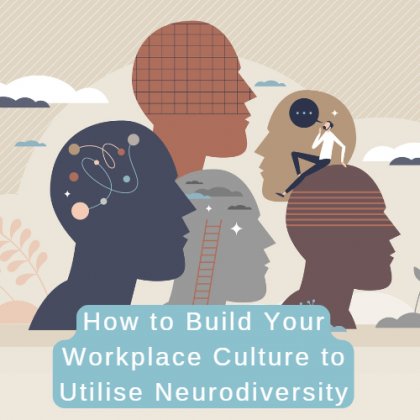Written by Mason Quah, Marketing Assistant
Work teams containing at least one neurodiverse person are 30% more productive than those without, according to a Harvard study. As similar results appear in other studies, more employers are looking at how they can incorporate neurodiverse workers into their offices as well as accommodations to help those already present.
Neurodiverse conditions such as autism spectrum disorder, dyslexia and attention deficit disorder have seen associations with better productivity. A poll of HR managers found that only 1 in 10 organisations account for neurodiversity in their management practices.
"What can I do?"
Communication is the lynchpin to optimising your workplace. A good starting point is always to ask what accommodations they may like to be made, but being too open-ended can sometimes discourage people from answering. Some options you might suggest or present as starting points in a discussion are:
- Use of planning tools. This can help with conditions that impact the ability to manage and prioritise tasks, broadly described as “executive dysfunction”. People with ADHD, behavioural conditions or just poor memory can benefit from having a clearly structured description of what tasks they need to do and the way that those tasks are prioritised. Having an entire team using the same tool can also improve scheduling and cooperation.
- Preferred methods of communication. Some people prefer the added nuance provided by in-person communication and the ability to ask questions on the fly, whereas others thrive on having digital communications records they can refer to. These preferences may be exacerbated by conditions that impact attention span, memory, and sociability.
- Recognise different approaches as valid. The recent surge in remote work has seen a trend of productive remote workers being passed over for promotions compared to less productive in-office counterparts. In the same way, there may be people in your office whose contributions aren’t being recognised because they have a non-standard approach to their work. A US study quantified this as ADHD people having a pay gap of over 30%. People with autism or ADHD may take measures to tune out distractions that result in them being less frequently noticed and therefore passed over for workplace commendations despite their higher productivity. They might also perform less confidently in performance reviews and promotion interviews. Incorporating other methods of reviewing their performance might improve the accuracy not only among neurodiverse people but across the office.
- Allow people the opportunity to experiment and find their own methods. Here at CSC, we had a team member with narcolepsy experiment with different combinations of stretches and exercises before finding a bright desk lamp that stops him from falling asleep at his desk.
.
Inclusive design benefits everyone
There are many aspects to the design of the world around us that we benefit from without realising they were introduced to help differently-abled people. The archetypical example is curb-cuts: The way that sidewalks slant into the road at intersections and crosswalks. This innovation was only popularised in the 70s and aimed to assist wheelchair users with navigating public spaces. Also benefiting from this are people rolling heavy luggage, cyclists, and people with short-term injuries.
In the same way, designing our workspaces to accommodate people who have different needs can also benefit everyone else at varying times. Improving your performance review system and interviewing practises to accommodate neurodivergent people also benefits other people who struggle with these systems for other reasons. Making your computers compatible with speech-to-text software can help people with typing difficulties, whether caused by motor function difficulties or hand injuries and can also allow for dictating to the computer while also taking written notes.

